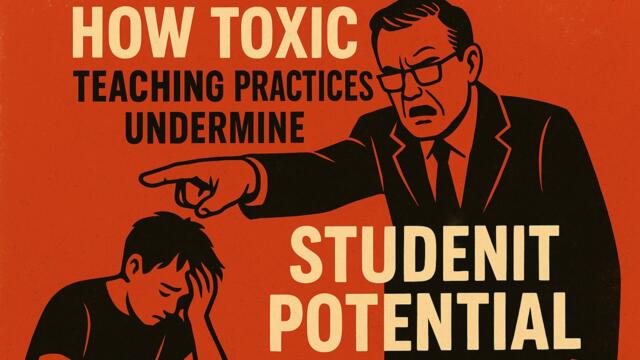- Blogs
- The Abuse of Authority in Higher Education: How Toxic Teaching Practices Undermine Student Potential
The Abuse of Authority in Higher Education: How Toxic Teaching Practices Undermine Student Potential

Rao Danish
When I arrived at university after more than a decade of studying side by side with my best friend, I expected us to pick up right where we left off. He had always been the brightest and kindest person I had ever known. Our friendly rivalry defined nearly every exam, every class, every evening spent together. Yet I barely recognised him after months of distance when I finally met him. The warmth and optimism that once lit his eyes had vanished, replaced by exhaustion, defeat, and pain.
“What happened?” I asked, stunned.
He looked at me, the spark of brilliance still faintly present but suffocated, and whispered: “The professors… I can’t take it anymore.”
He confided that he was slipping under the oppressive weight of cruel remarks, unreasonable expectations, and an atmosphere of intimidation. The people entrusted with nurturing his potential had instead become the source of his despair. Professors who should have guided him forward mocked him in front of peers, imposed workloads designed more to control than to teach, and showed little empathy for students' struggles. So profound had the toll become that he had started taking antidepressants and sleep medication, desperately trying to hold himself together. This loss of a friend’s light, the very person I had most hoped would soar, became my catalyst. It moved me from heartbreak to purpose, and it forced me to write.
Authority Turned Against Potential
Authority in academia is meant to serve a noble purpose. It exists to set standards, cultivate intellectual rigor, and inspire growth. Yet when authority turns toxic, it transforms into a weapon that fractures minds and extinguishes dreams. Too many professors, emboldened by their position, resort to power-based teaching. They disguise their harshness as discipline, their intimidation as rigor, and their dismissiveness as high standards. The results are devastating. Students begin to shrink, stop asking questions, and withdraw from lectures, not because they are lazy or disinterested, but because they are afraid. These brilliant minds, once eager to contribute, are drained and silenced.
The Cost of Toxicity
The damage does not stop at personal suffering. Research consistently links hostile academic environments to increased anxiety, depression, and disengagement. When classrooms become arenas of fear, attendance drops and motivation collapses. Students associate education with pain rather than growth, survival rather than curiosity. In the long term, this culture of fear undermines academic progress itself. It wastes generations of potential, not because students lack ability, but because the soil of mentorship has been poisoned.
Why It Happens
Part of the answer lies in culture. Many professors were once students under harsh mentors themselves, and cruelty has been normalised as a rite of passage. Another factor is the absence of accountability. Universities often evaluate faculty based on research publications, funding, or tenure, while student well-being is sidelined. Most dangerously, abusive behaviour is usually disguised as toughness. Intimidation is excused as preparing students for the real world, while those who resist are labelled weak.
Hopeful Pathways Forward
Yet there are better ways. Some universities have embraced models of teaching that place humanity at the centre. They require faculty to undergo training in empathy, communication, and mental health awareness. They implement student feedback systems that go beyond rating subject expertise and instead measure respect, clarity, and support. Studies have shown that professors who adopt an empathy-led approach do not compromise academic rigour. Instead, they inspire resilience, creativity, and lasting engagement. Learning thrives not in fear, but in trust.
A Call to Professors and Institutions
To the professors who hold the power to shape minds, I ask: What legacy do you wish to leave? Does your classroom lift or oppress? Do your words inspire curiosity, or do they silence it? The mark of a true educator is not measured in how small students feel under their gaze, but in how much they grow because of it. To universities and institutions, authority without accountability is dangerous. Create transparent channels for students to voice concerns. Value teaching evaluations that assess empathy alongside expertise. Reward those who nurture potential, not those who stifle it.
Conclusion: Reclaiming the Purpose of Higher Education
The purpose of higher education was never meant to chain students in fear. It was meant to free them into discovery, to open their minds to possibility. I witnessed when one of the brightest people I knew was reduced to shadows because of oppressive professors. I do not write this to condemn, but to urge recovery. The ecosystem of academia is wounded, and it demands healing.
Imagine classrooms not as battlegrounds, but as sanctuaries of thought. Imagine professors not as gatekeepers of fear, but as guardians of potential. Authority deserves respect, but respect cannot be commanded through cruelty. It must be earned through guidance, empathy, and genuine leadership. The time has come to transform the higher education culture, reclaim its true purpose, and restore hope for every student who enters a classroom with a dream.
Disclaimer: The views expressed in this article are solely those of the author and do not necessarily reflect the official stance of The Himalayan Research Institute Pakistan - (THRIP)
_________________________________
Danish is a BBA student at the University of Engineering and Technology, Lahore, Pakistan. He is interested in business communication, marketing, and social development and enjoys writing articles that inspire meaningful conversations among youth.
Contact us

Write with Us
The Himalayan Research Institute is proud to introduce "Himalayan," a dynamic and insightful magazin...
- [email protected]
- +923426470466
- website
